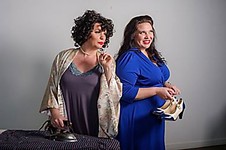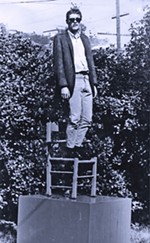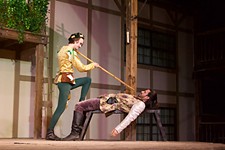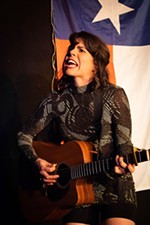Different Stages' The Book Club Play
This production captures both the cringeworthy humor and drama of its characters in a mockumentary for the stage
Reviewed by Trey Gutierrez, Fri., March 29, 2019

It's easy to understand why mockumentaries have found such success in popular culture. TV shows like The Office and Parks and Recreation, which purport to capture the everyday lives of regular people, provide opportunities for storytellers to discover humor in life's seemingly mundane experiences. Though typically scripted, works in this style convincingly portray the impromptu nature of the human experience. That said, seeing this genre adapted for the stage is an experience in and of itself.
As its title suggests, The Book Club Play chronicles the experiences of people who meet biweekly to discuss literary works. In a unique and inspired choice of framing device, playwright Karen Zacarías casts this group of five working professionals as the subject of a documentary by an acclaimed film director. With the filmmaker's unseen camera – located in the stage's fourth wall – supposedly recording throughout the play, the characters are aware they're being observed. This awareness adds a level of intimacy between actor and audience that feels fresh and engaging – and oftentimes uncomfortable. As the play progressed, I felt myself increasingly becoming the elephant in the room, as if I personally had invaded the privacy of this gathering.
Perhaps the reason I felt my presence so readily was that The Book Club Play's cringeworthy humor evokes empathy for its characters. As with popular pseudodocumentary works, the ever-present camera leads to a host of awkward, unintentional faux pas as the group's members put on appearances for their audience. For example, we feel the group's discomfort when club host Ana asks Lily, its sole black member, to suggest a book with "soul" in a tone-deaf attempt to inject culture into the club's repertoire. We can't help but laugh at such moments because we feel a genuine embarrassment for the characters experiencing them, the same way we would for close friends in similar situations.
This sense of realism created by the cast of this Different Stages production, however, is a double-edged sword. While the humor feels familiar and realistic, so does its drama. As the show progresses, we see the facades that the group members have chosen to hide behind crumble. Characters that once seemed simple and one-dimensional reveal their hidden pains, struggles, and yearnings, creating heavy conflict amongst the group.
It was here that Book Club challenged me as a viewer. Although the script's humor doesn't cease even at its tensest moments, there were many times where I couldn't tell if I was meant to laugh or not. During the show's climax, wherein Ana flies into a fit of primal rage, other characters still deliver one-liners. I couldn't bring myself to laugh, though, as Ana's painful screams (delivered with gusto by Different Stages regular Kelsey Mazak), as well as the concerned reactions of her friends, seemed too vivid. I found myself experiencing actual panic as lamps and chairs were knocked over, as if I was witnessing the breakup of a real-life friend group. By virtue of the cast's ability to play off of each other's authentic emotions, this moment of chaos was visceral and honestly scary.
Not surprisingly, I left the Santa Cruz Theatre emotionally drained, though not without a sense of satisfaction. While I often look to theatre as a method of escaping reality, Different Stages' latest presented quite an opposite experience, one akin to screaming into a pillow to achieve catharsis. As I reflect on the performance, I can't help but dwell on how the filmmaker's camera was the true driving force behind it. After all, this show takes a lot from the medium it satirizes. As is the case with the documentaries that have the greatest impact on us, The Book Club Play showcases the sort of real-life spontaneity and complex emotion that isn't easily captured in a traditional script.
The Book Club Play
Santa Cruz Theatre, 1805 E. Seventhwww.differentstagestheatre.org
Through April 13
Running time: 1 hr., 55 min.












